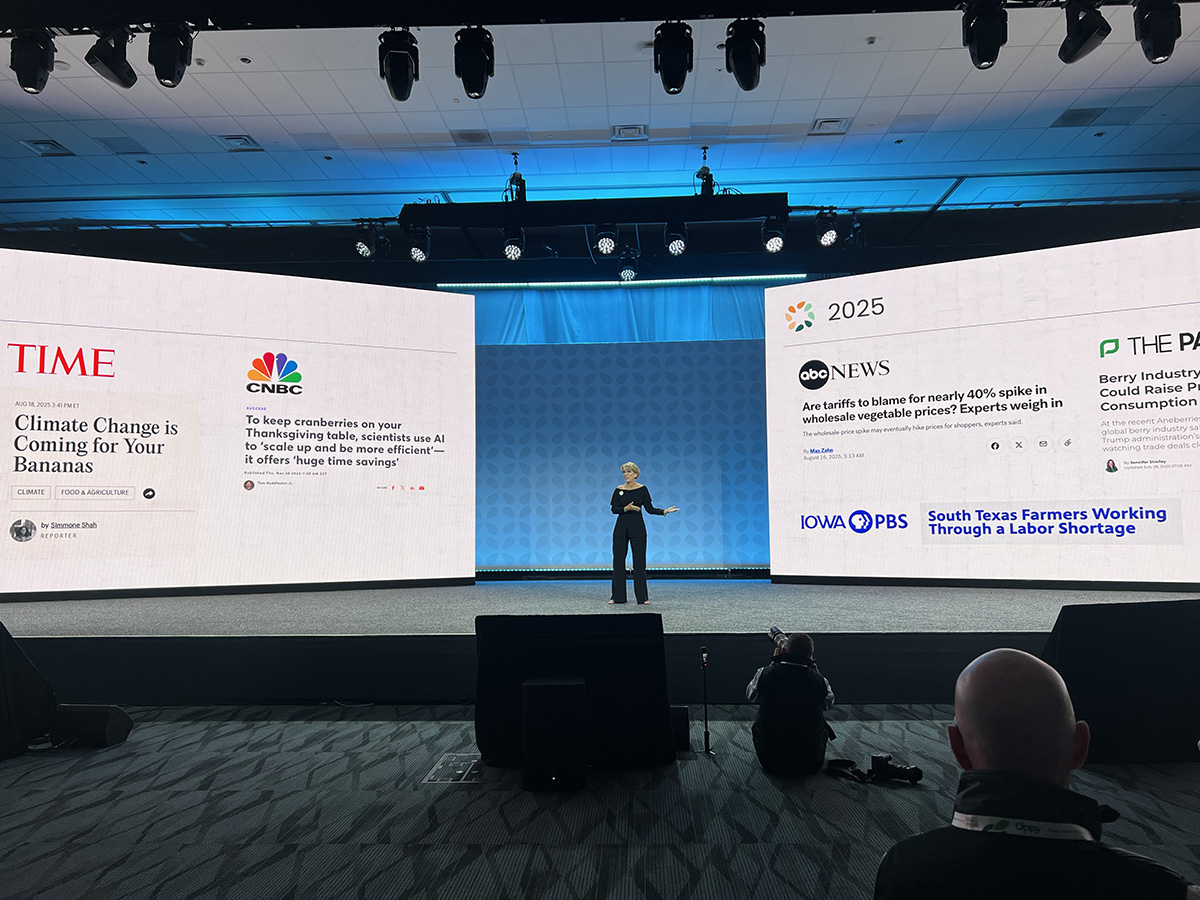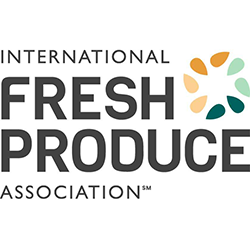ANAHEIM, Calif. — While the fresh produce industry faces a multitude of threats from geopolitical risks to tariffs and inflation to labor and extreme climate events, the International Fresh Produce Association continues to “Fight for Fresh,” says CEO Cathy Burns, who delivered a compelling state of the industry keynote to a packed room at the IFPA Global Produce and Floral Show on Oct. 16.
“At the end of the day, we’re here to bring clarity to the confusion and context to the craziness. With the many threats that are facing us today, I want you to know we have your back,” she said. “You told us your top priority was advocacy, and I promised last year that we would increase our investment around advocacy to ‘Fight for Fresh’ and we have, both here and around the world.”
Tariffs and Global Trade
Tariffs and their impact on global trade is one of the biggest issues facing the industry this year, and a key area of focus for IFPA in its advocacy efforts.
“We believe in science-based trade policies and transparent rules-based trading systems,” says Burns. “IFPA has been advocating for exemptions for all fresh produce and floral products in particular, USMCA (U.S.-Mexico-Canada Agreement). We really encourage the U.S. administration and trading partners to create deals to remove country specific tariffs, and we expand and support connections and market intelligence in other priority markets.”
IFPA members are also playing a key role, says Burns, by sharing data with the U.S. Trade Representative’s office and the National Economic Council that shows the economic impact of tariffs. IFPA, its board and its members are advocating for exemption of tariffs on fresh produce products.
“Certainly, the lasting impacts of these tariffs are unclear,” she says.
The uncertainty created by tariffs is also disrupting the industry.
“We are encouraging governments to get to the table — to talk — because the uncertainty is actually hurting us as much as the tariffs,” Burns told The Packer in an interview following her keynote. IFPA continues to advocate for the government to provide some level of certainty, she says.
“I would also highlight that USMCA is up for renegotiation in 2026, so we are advocating for a ‘Do No Harm’ position for across North America and protect the original tenants of USMCA,” she says.
During her keynote address, Burns talked about the role of technology and artificial intelligence in tackling the top issues facing the industry, including tariffs.
Scientists at Stanford have developed an interactive tool that tracks how companies worldwide react to economic pressures. Powered by AI, this geo-economic monitor reveals the effects of tariffs, sanctions and export controls, she says.
“Not surprisingly, the monitor found that 40% of global organizations indicate just the threat of future tariffs is already negatively impacting their operations,” says Burns.
Tariffs and inflation are also impacting consumer behavior.
“Our global insights intelligence team found that 66% of consumers are purchasing fewer foods and opting for smaller sizes,” she says. “There is good news, though, fresh fruits and vegetables are the least likely item for consumers to give up, with only 5% reducing purchases.”
Burns also sees the health benefits of fruits and vegetables helping to build a case for tariff exemptions.
“Imports of fresh fruits and vegetables improved dietary risks in importing countries,” she says. “So, we have to keep working to ensure the data we have is delivered to decision makers. Bottom line is: our products matter and they save lives.”
Rising Labor Pressures
Farm labor has been a contentious issue for decades, says Burns, and this year the pressures have been enormous.
Rising labor costs contributed to making this year’s crop one of “the most expensive crops ever planted, harvested, shipped and sold,” says Burns, pointing to apple growers whose labor costs represented 30% of their production costs in 2013 and for whom labor now represents 70% of their costs.
In her state of the industry address, Burns also highlighted IFPA’s two significant wins in the last year on the labor front: It won its lawsuit against the U.S. Department of Labor contesting its unconstitutional regulatory overreach and limitations on the freedom of speech of farmers who employ temporary workers. It also advised the Department of Labor to create a position solely dedicated to farm labor and develop a less burdensome Adverse Effect Wage Rate (AEWR).
“And they did,” said Burns. “This resulted in the most significant financial shift ever for growers in H-2A.”
Burns says she spoke with one farmer with 850 acres who said the AEWR change saved the farm $2 million.
In an interview after her keynote, Burns said these labor wins signify movement.
“We’ve been fighting this labor battle for 37 years, and it feels like for the past 37 years, we’ve been in a stalemate, and we now have an administration that is actually focused on deregulation,” Burns said. “For every one new regulation or policy change, 10 have to be removed. Winning the lawsuit gave us the confidence to continue to fight for fresh and fight for reduced restrictions on labor.
“And then when the AEWR change was announced last week, it was the single biggest economic impact in a positive way to our growers that use H-2A,” she continued. “We are advocating for a consistent, workable labor reform solution that works for everybody, and we feel like we have some momentum. The proof will be whether we can get it over the finish line.”
Burns says IFPA also collaborated with the Department of Homeland Security and ICE to not go to farms unless they have an active warrant.
“In fact, based on the great work by our team, I received a call from Secretary Chavez-DeRemer personally assuring me that the raids on farms and processing plants will stop and if I were to hear of anything happening anywhere that I was to call her personally on her cell phone,” Burns says.
Burns says IFPA is urging policy makers to resolve the industry’s labor challenges and at the same time is advocating for more investment in innovation like robotics.
‘Obsessed’ With AI
When it comes to AI, “I need to be honest, I’m obsessed,” said Burns in her keynote. “I know there’s a demon side to it, but there’s no question [that] it’s making our organization more efficient, but it’s beyond that; it’s ensuring that every member — that all of you — have the power to see around corners, to anticipate trends and to act faster with confidence.”
Burns says the biggest example of IFPA embracing AI is its newly launched global intelligence engine that “provides all our research and proprietary data at the fingertips of our members” on the IFPA website.
“I’m so excited that this is going to give you a trusted AI engine at your fingertips,” says Burns.
Technology is also playing a critical role in sustainability and production, says Burns, adding it’s building resiliency into the supply chain, aiding food safety and more.
Make America Healthy Again
IFPA’s Fresh Produce for a Healthier America campaign intentionally put fresh produce “front and center” for the Make America Healthy Again Commission, says Burns.
“This campaign is laser-focused on positioning our product as the solution. This is why we provided eight and then 10 policy recommendations to the MAHA commission on how fruits and vegetables must be foundational on all public health interventions,” she said.
Burns says IFPA is taking the spirit of this effort globally, so that policy makers around the world recognize how integral fresh fruits and vegetable are to global health.
“We’re fighting for fresh, and it’s working,” she says.











